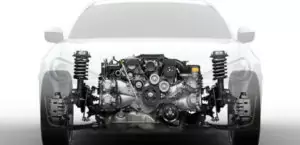The 1.9-liter VW 1Z 1.9 TDI diesel engine was produced by the concern from 1991 to 1997 and was installed in many cars of the German company, but is better known for the Passat B4 model. After a slight upgrade, this power unit received a completely different AHU index.
The EA180 series also includes: 1Z, AFN, AHF, AHU, ALH, AVG, AKU, AEY.
Specifications
| Production years | 1991-1997 |
| Displacement, cc | 1896 |
| Fuel system | direct injection |
| Power output, hp | 90 |
| Torque output, Nm | 202 |
| Cylinder block | cast iron R4 |
| Block head | aluminum 8v |
| Cylinder bore, mm | 79.5 |
| Piston stroke, mm | 95.5 |
| Compression ratio | 19.5 |
| Features | SOHC |
| Hydraulic lifters | yes |
| Timing drive | belt |
| Phase regulator | no |
| Turbocharging | yes |
| Recommended engine oil | 5W-40 |
| Engine oil capacity, liter | 4.3 |
| Fuel type | diesel |
| Euro standards | EURO 2 |
| Fuel consumption, L/100 km (for VW Passat 1995) — city — highway — combined |
6.7 4.1 5.3 |
| Engine lifespan, km | ~450 000 |
The engine was installed on:
- Audi 80 B4 (8C) in 1991 – 1995;
- Audi A4 B5 (8D) in 1995 – 1996;
- Audi A6 C4 (4A) in 1994 – 1996;
- Seat Cordoba 1 (6K) in 1995 – 1996;
- Seat Ibiza 2 (6K) in 1995 – 1996;
- Seat Toledo 1 (1L) in 1995 – 1996;
- Volkswagen Caddy 2 (9K) in 1995 – 1996;
- Volkswagen Golf 3 (1H) in 1993 – 1996;
- Volkswagen Passat B4 (3A) in 1993 – 1997;
- Volkswagen Sharan 1 (7M) in 1995 – 1996;
- Volkswagen Vento 1 (1H) in 1993 – 1996.
Disadvantages of the Volkswagen 1Z engine
- This is a very reliable motor and breakdowns happen only at very high mileage;
- The main problem is valve seat burnout and, as a result, loss of compression;
- Look for the cause of failures in thrust in the turbine control system, mass air flow sensor, EGR valve;
- The culprit for the oil leak here is most often the bursting lower flange of the crankcase ventilation tube;
- The ribbed belt due to a breakdown of its roller sometimes gets into the timing and the end of the motor.






